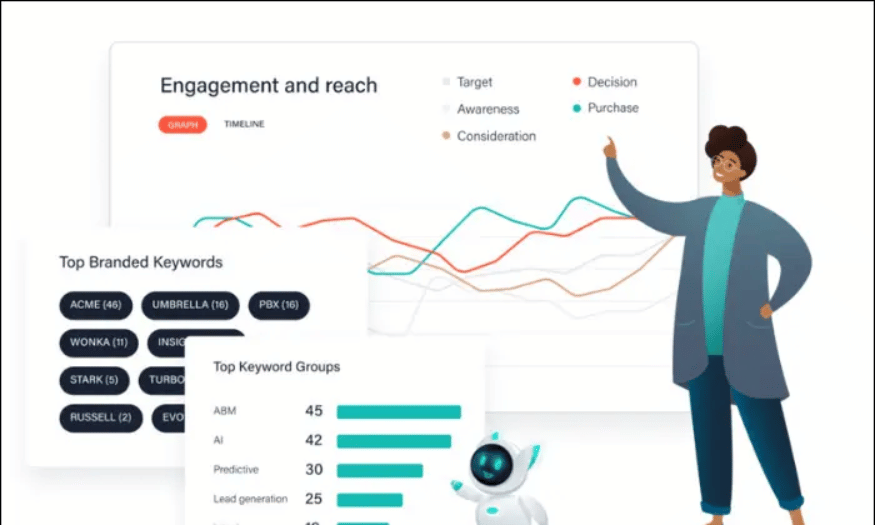Best Selling Products
Applying AI in Sales to Boost Revenue
Nội dung
- 1. Planning support
- 2. Decision support
- 3. Competitor analysis
- 4. Classify and evaluate potential customers
- 5. Customer behavior analysis
- 6. Analyze customer sentiment
- 7. Personalize the customer experience
- 8. Customer support chatbot
- 9. Automated content generation
- 10. Create images and videos
- 11. Conclusion
In today's digital age, artificial intelligence (AI) is becoming an indispensable tool in the sales strategies of many businesses. The application of AI not only helps optimize the sales process but also creates better customer experiences. From analyzing customer data to automating customer care processes, AI is opening up new opportunities for businesses to increase revenue. In this article, Sadesign will explore with you the specific applications of AI in sales and how businesses can take advantage of this technology to grow strongly.

In today's digital age, artificial intelligence (AI) is becoming an indispensable tool in the sales strategies of many businesses. The application of AI not only helps optimize the sales process but also creates better customer experiences. From analyzing customer data to automating customer care processes, AI is opening up new opportunities for businesses to increase revenue. In this article, Sadesign will explore with you the specific applications of AI in sales and how businesses can take advantage of this technology to grow strongly.
1. Planning support
In today’s business world, building an effective sales plan is crucial. The application of artificial intelligence (AI) has opened up new opportunities for businesses to plan accurately and quickly. By analyzing big data from various sources, AI helps businesses better understand market trends, customer behavior, and the performance of previous campaigns. This allows businesses to not only predict demand but also adjust plans flexibly and promptly.
In addition to creating realistic plans, AI is also capable of identifying market fluctuations early. Thanks to its continuous analysis capabilities, AI can detect the slightest changes in customer behavior or the emergence of new competitors. This allows businesses to adjust their sales strategies, thereby minimizing risks and optimizing sales performance.
Some tools that help businesses with sales planning include ClickUp, which helps manage projects and allocate resources efficiently, and HubSpot Scheduling, which provides analytics-driven marketing strategies. The combination of these tools not only saves businesses time but also increases the accuracy of their sales planning.
.png)
2. Decision support
Business decisions are not based solely on intuition but on specific and accurate data. AI does not simply collect data but also transforms data into valuable information, helping businesses make faster and more accurate decisions. With the ability to process large volumes of data, AI can analyze customer behavior patterns, purchasing trends and business performance, thereby supporting managers to make decisions based on data instead of emotions.
Optimizing operational processes through AI not only helps businesses increase efficiency but also improves the success rate of business strategies. Thanks to its deep analytical capabilities, AI can point out weaknesses in current strategies and suggest necessary changes to improve results.
Tools like Tableau AI enable data visualization, making it easy for users to see trends and patterns in data. MonkeyLearn focuses on analyzing and extracting insights from text data, providing managers with insights for decision-making. Using these tools not only helps businesses improve their competitiveness but also creates a superior advantage in the market.
3. Competitor analysis
In a competitive business environment, understanding your competitors is essential to developing effective strategies. AI has become a powerful tool for competitor analysis, saving businesses time and effort in collecting data. Instead of spending a lot of time on manual analysis, AI can scan data from various sources, from selling prices, marketing strategies to customer feedback.
By collecting and analyzing this information, AI helps businesses clearly identify the strengths and weaknesses of their competitors. This not only helps businesses adjust their competitive strategies but also discovers untapped opportunities, thereby creating smart moves in the market.
Tools like ClickUp Brain help businesses gather information and analyze their competitors’ activities effectively. Crayon AI, with its ability to monitor competitors’ activities in real time, helps businesses stay updated with the latest information and adjust their strategies in time. AI-assisted competitor analysis not only helps businesses stand out but also strengthens their competitive position.
.png)
4. Classify and evaluate potential customers
Identifying and classifying potential customers is one of the important tasks in sales. AI can help businesses do this effectively by collecting and analyzing data from various sources such as websites, social networks and email marketing. Thereby, AI helps to group customers according to behavior, interests and needs, thereby focusing on customers with the highest conversion potential.
This classification not only helps businesses save time but also optimizes resources in marketing strategies. Once they understand potential customers, businesses can design marketing campaigns suitable for each target group, thereby increasing conversion rates and revenue.
Tools like Clearbit AI help identify potential customers from website traffic, while MISA AMIS aiMarketing supports collecting and classifying customers to nurture relationships automatically according to workflow. Applying these tools not only helps businesses improve sales efficiency but also builds long-term relationships with customers, thereby creating sustainable value for the business.
5. Customer behavior analysis
In today’s competitive business environment, understanding customer behavior is key to creating effective marketing strategies. Thanks to artificial intelligence (AI), businesses can accurately grasp customer shopping habits, preferences, and motivations by collecting and analyzing data from various sources, such as browsing history, purchases, and interactions on social media channels.
AI not only helps businesses identify typical customer behavior patterns but also allows them to optimize their marketing strategies. By sending the right message to the right audience at the right time, businesses can effectively increase conversion rates. Analyzing customer behavior also helps businesses discover new opportunities in developing products and services, thereby creating added value for customers.
Tools like Google Analytics 4 allow businesses to analyze customer behavior on the website in detail, while Hotjar AI provides specific information through heat maps, helping businesses see more clearly how customers interact with content. Thanks to this information, businesses can adjust their marketing strategies to better suit the actual needs of customers.
.png)
6. Analyze customer sentiment
In the information age, understanding customer sentiment and feedback is extremely important. AI is capable of reading, understanding and analyzing millions of reviews, comments and feedback from customers on online platforms. This helps businesses determine the level of satisfaction as well as positive or negative feelings towards their products or services.
With this analytical capability, businesses can detect problems early and resolve complaints quickly. This not only helps retain customers but also increases brand trust and credibility. By adjusting sales strategies based on customer sentiment, businesses can improve their products and services, thereby enhancing the customer experience.
Tools like Lexalytics allow businesses to analyze sentiment from customer reviews automatically and accurately. MonkeyLearn Sentiment Analysis also helps to quickly evaluate customer feedback, giving businesses an overview of how the market feels about their products.
7. Personalize the customer experience
Personalizing the customer experience is not just a trend but has become a decisive factor in customer retention. AI helps businesses build a personalized shopping journey, from recommending the right products to displaying advertising content that matches their interests. This personalization not only increases the purchase rate but also creates a sense of attachment and understanding for customers towards the brand.
By using AI to personalize experiences, businesses can send marketing emails based on real customer behavioral data. This makes customers feel noticed and cared for, thereby creating a positive impression of the brand. Personalization not only helps businesses increase revenue but also builds long-term relationships with customers.
Tools like Dynamic Yield allow businesses to make personalized product recommendations based on customer preferences and behavior, while Segment AI helps personalize marketing campaigns to suit each customer segment. Applying these technologies not only benefits businesses but also enhances customer experience, creating sustainable value in brand relationships.
.png)
8. Customer support chatbot
In the digital age, AI chatbots are becoming an important part of businesses’ customer care strategies. With the ability to handle more than 95% of frequently asked questions without requiring human intervention, chatbots not only help save on human resources costs but also ensure quick responses, creating a positive experience for customers. Thanks to machine learning technology, chatbots can automatically learn from conversations, improving their language skills to provide more natural and accurate responses.
Beyond customer support, AI chatbots can also provide product advice, payment instructions, and order processing. This improves the online shopping experience, increases customer satisfaction, and drives revenue for businesses. Customers can get immediate answers to their questions without having to wait, which is important in a context where consumers increasingly expect quick responses.
Tools like Drift help businesses connect with potential customers right on the website, effectively improving the closing rate. MISA AVA, a comprehensive digital assistant, developed with advanced AI technology, not only provides customer care support but also performs daily business management tasks, creating a smooth experience for users.
9. Automated content generation
One of the prominent applications of AI in sales is the ability to automatically generate content. Businesses can take advantage of AI to write blog posts, product descriptions, advertising content, and even marketing emails quickly and effectively. This not only saves time but also ensures the quality of content, helping to attract customers in the most optimal way.
AI has the ability to recommend content based on customer search intent, ensuring that the content is always relevant and engaging for each audience. This is extremely important in improving customer experience and optimizing conversion rates. By using AI, businesses can create sharper and more effective communication messages.
Cheap ChatGPT Upgrade
Tools like Chat GPT help businesses create content efficiently, while Copy.ai makes it quick and easy to create advertising content. These tools not only save time but also open up many creative opportunities for businesses to reach and engage with customers.
.png)
10. Create images and videos
In addition to creating text content, AI is also capable of creating professional images and videos. This is a great benefit for businesses in producing attractive visual content without investing in a large design team. AI can create product images, animated promotional videos, and even creative content suitable for each media platform.
Using AI in image and video creation helps businesses save on content production costs while optimizing the performance of advertising campaigns. High-quality image content and creative videos have the ability to attract customers' attention, create strong impressions, and promote shopping behavior.
Tools like Genspark AI allow businesses to quickly create professional product images, while Synthesia AI supports the creation of AI-powered promotional videos. Thanks to the development of this technology, businesses can not only improve marketing efficiency but also create impressive experiences for customers, thereby building a stronger brand.
11. Conclusion
In short, the application of AI in sales is not only a trend but has become an essential need in the context of increasingly fierce competition. Businesses need to invest in AI technology to optimize sales processes, improve customer experience and maximize revenue. By understanding and effectively applying AI technology, businesses will not only survive but also thrive in the future.












































